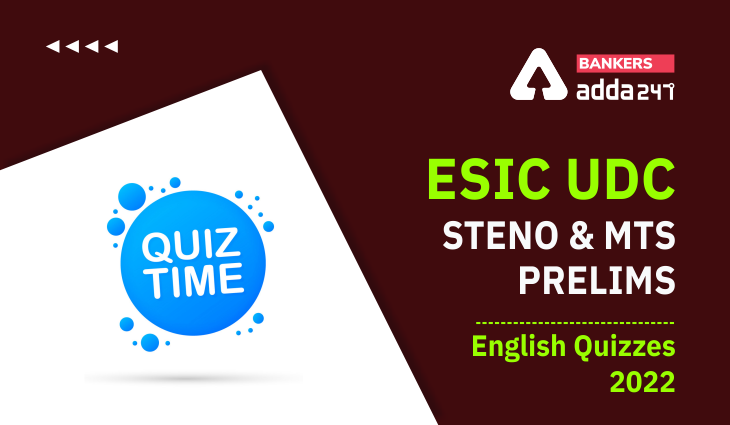Directions (1-10): In the following passage there are blanks, each of which has been numbered. These numbers are printed below the passage and against each five words are suggested, one of which fits the blank appropriately. Find out the appropriate words without changing the meaning of the passage.
Chess is certainly one of the oldest games in the world, and perhaps also the most widespread. No matter where you go, it is (1) that you will be able to find someone living there who plays, or at least knows (2), chess. But the (3) of chess remain shrouded in mystery, and various writers have (4) the invention of the game to virtually every one of the great early civilizations.
A careful (5) at the competing claims, however, reveals that India at around 550 A.D. may in fact be the strongest (6). A Persian poem written in 600 A.D. declares that chess came to Persia from India, and before 550 A.D. there are no specific references to the (7) in any literature whatsoever.
In India, chess was called chaturanga, meaning “four parts.”The name (8) to the four army divisions which were standard at the time: foot soldiers, cavalry, chariots, and elephants. Such terminology confirms (9) all doubt that chess was (10) an abstract representation of war from the outset. Over the following centuries, like a true conqueror, chess spread across the globe, becoming ever more popular even as earthly empires rose and fell.
Q1.
(a)Probably
(b) Likely
(c) Surely
(d) Undoubtedly
(e)Mostly
Q2.
(a)How
(b) Of
(c) That
(d) About
(e) Off.
Q3.
(a)Beginners
(b) Births
(c) Initials
(d) Origins
(e) Discovery.
Q4.
(a)Attributed
(b) Explained
(c) Claimed
(d) Reported
(e) Voiced.
Q5.
(a)Study
(b) Look
(c) Examination
(d) Consideration
(e) Sight.
Q6.
(a)Applicant
(b) Player
(c) Candidate
(d) Inventor
(e) Example.
Q7.
(a)Game
(b) Country
(c) Poem
(d) Persians
(e) Invention.
Q8.
(a)Describes
(b) Responds
(c) Refers
(d) Equals
(e) References.
Q9.
(a)Above
(b) Beyond
(c) Without
(d) In
(e) Almost.
Q10.
(a)Designed
(b)Considered
(c) Thought
(d) Known
(e)Result off
Directions (11-15) : Find out the error, if any. If there is no error, the answer is (e), i.e. No error. (Ignore the errors of punctuation, if any.)
Q11. The driver of the car (a) / is sounding horn for (b) / the last ten minutes (c) / but nobody tells him to stop. (d) / No Error. (e)
Q12. He telephoned from a public call-box (a) / so that the call (b) / would not be traced (c) / to his own address. (d) / No Error. (e)
Q13. Most people like (a)/to rest after a day’s work (b)/ but he seemed (c)/ to have an in exhaustive supply of energy. (d)/ No error. (e)
Q14. The aim of the course (a)/ will be to cater to students with diverted needs (b)/ from basic knowledge(c)/ to top end research and publishing skills.(d)/ No error(e)
Q15. A really good constitution (a)/holds up the mirror to government (b)/ and enables the public as well as (c)/leadership to identify shortfalls. (d)/ No error (e)
Solutions
S1.Ans.(b)
S2.Ans.(d)
S3.Ans.(d)
S4.Ans.(a)
S5.Ans.(b)
S6.Ans.(c)
S7.Ans.(a)
S8.Ans.(c)
S9.Ans.(b)
S10.Ans.(b)
S11.Ans.(b)
Sol.
Replace ‘is surrounding’ with ‘has been surrounding’ as the sentence is in present perfect continuous.
S12.Ans.(c)
Sol.
Use ‘back’ after ‘traced’.
S13.Ans.(c)
Sol.
Use ‘seems’ in place of ‘seemed’. Present Indefinite form of verb is required. It is a fact about nature.
S14.Ans.(b)
Sol.
‘Divert’ is a verb and it should not be used here in the form of ‘diverted’. Instead, we should use ‘diversifying’ which is an adjective and that qualifies a noun well.
S15.Ans.(e)
Sol.
No error.
Click Here to Register for Bank Exams 2022 Preparation Material





 English Language Quiz For Bank Foundatio...
English Language Quiz For Bank Foundatio...
 English Language Quiz For SBI Clerk Prel...
English Language Quiz For SBI Clerk Prel...
 English Language Quiz For SBI Clerk Prel...
English Language Quiz For SBI Clerk Prel...







